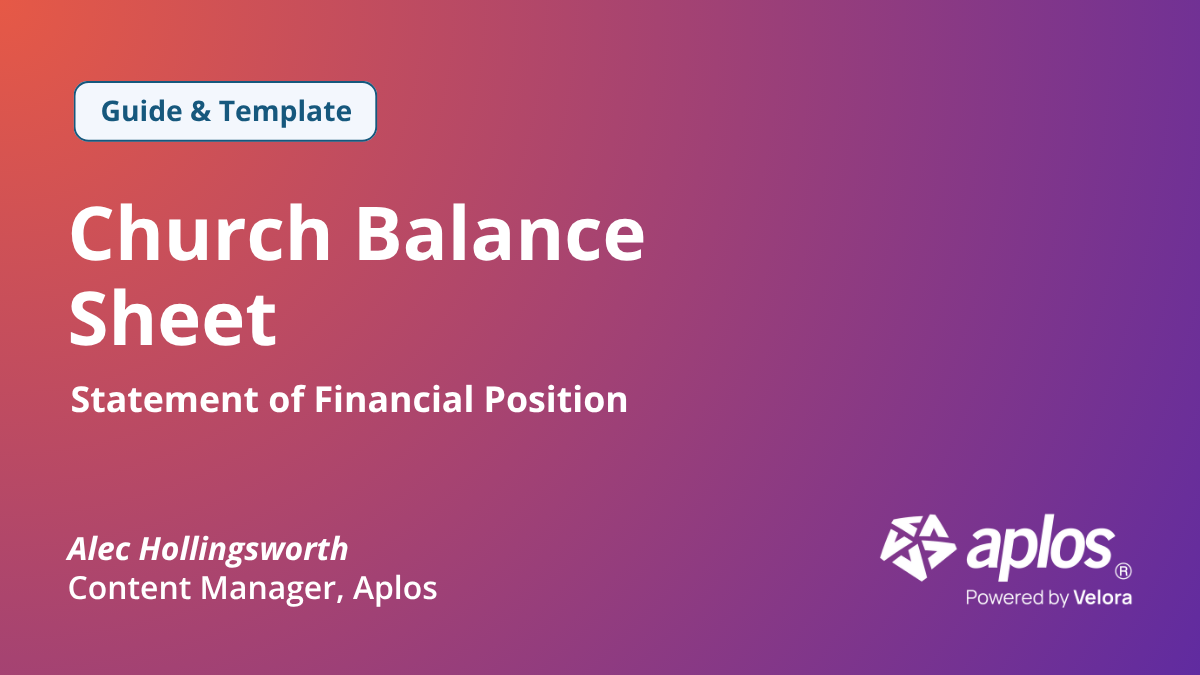
Church Accounting Best Practices 2025: The Essential Guide

Church Accounting Best Practices 2025: The Essential Guide
Effective church accounting practices are key to transparency and compliance. This guide covers essential church accounting practices such as fund accounting, delegating responsibilities, and using specialized software. Let's learn how to manage your church’s finances responsibly!
Key Takeaways
- Fund accounting enhances financial transparency and accountability, ensuring donations are used as intended and aiding compliance with FASB guidelines.
- Delegating accounting responsibilities and using specialized accounting software maintain accurate financial records and compliance.
- Regular financial reporting and internal audits, alongside effective payroll management, promote trust, transparency, and financial health within churches.
Implementing Fund Accounting

Fund accounting is essential for transparent church finances. It categorizes revenue and expenses into specific funds, ensuring donations are used as intended. This method supports accountability, responsible handling of contributions, and fosters trust within the congregation.
It organizes income by collection and usage, allowing donors to restrict gifts for specific purposes. Fund accounting enhances financial transparency and aids compliance with financial accounting standards board (FASB) guidelines. Proper fund accounting policies help churches manage designated and restricted funds effectively.
Benefits of Fund Accounting
Fund accounting promotes financial responsibility and transparency. It ensures restricted funds are used properly, protecting the church’s reputation and maintaining donor trust. Compliance with FASB standards through fund accounting enhances credibility, attracting community support.
- Prevents misallocation of funds, maintaining accurate financial records and efficient bookkeeping.
- Enables detailed financial reporting, helping church leaders understand the church’s financial position and health.
- Vital for effective financial management and stewardship, focusing on accountability rather than profitability.
Setting Up Fund Accounting
Setting up fund accounting involves customizing the chart of accounts to the church’s needs, as standardized charts may not be ideal. Dedicated accounting software simplifies this process and improves reporting accuracy.
Cloud-based fund accounting tools tailored for ministries are recommended for managing multiple funds and revenue streams. Proper fund accounting processes and software ensure efficient bookkeeping and accurate records.
Delegating Accounting Responsibilities

Delegating accounting responsibilities is crucial for accurate records and tax compliance. A structured team typically includes:
- A bookkeeper
- An accountant
- Reliable accounting software
Clear role definitions distribute financial tasks, minimize errors, and enhance transparency. This approach maintains the church’s financial health and management, allowing leaders to focus on their mission.
Role of Church Bookkeepers
Church bookkeepers manage daily financial transactions, payroll, donations, and maintain accurate records. Their role is vital for efficient bookkeeping and compliance.
- Manage daily financial transactions, including donations and expenses
- Handle the church’s payroll accurately and timely
- Maintain accurate and up-to-date financial records
- Ensure efficient church bookkeeping to support financial transparency
- Possess specialized training to enhance effectiveness (though not always required)
- Work full-time, part-time, or volunteer depending on the church’s needs
- Maintain vigilance to help the church avoid losing tax-exempt status or facing penalties
- Play a crucial role in maintaining the church’s financial integrity and transparency
Aplos offers Church Bookkeeping services - Learn more here!
Hiring a Church Accountant
Choosing between an in-house accountant or outsourcing depends on the church’s size and financial complexity. In-house accountants provide dedicated attention, strategic advice, and ensure compliance.
Outsourcing offers professional expertise cost-effectively for smaller congregations. Accountants should have accounting degrees, church experience, and regulatory knowledge. Churches classified as nonprofits by the IRS follow similar accounting practices to other nonprofits, supporting mission and financial health.
Utilizing Church Accounting Software

Dedicated church accounting software improves financial management over Excel by:
- Automating transactions and reporting
- Handling complex finances with dedicated funds
- Managing multiple revenue streams
Such software tracks funds effectively, customizes charts of accounts, and ensures accurate reporting, facilitating efficient bookkeeping and enhancing financial health. Learn more about how Aplos compares to Quickbooks!
Recommended Software Options
Aplos is a highly recommended church accounting software, offering comprehensive features tailored for church management, including detailed reports, pledge tracking, and custom donation forms.
Creating and Maintaining an Annual Budget
An annual budget guides ministry efforts and ensures financial stewardship. The operating budget details predicted revenue and expenses for the fiscal year.
Responsible accounting practices ensure compliance with legal requirements and GAAP. Creating and maintaining a budget aligns resources with mission and priorities, supporting long-term financial health. Though not always required, filing Form 990 promotes transparency.
Drafting the Budget
Categorize income from donations, rentals, and grants for accurate planning. Expenses should be divided into fixed costs (e.g., salaries) and variable costs (e.g., outreach programs) to clarify functional expenses.
Budgets should align with mission priorities to promote stewardship and financial health.
Monitoring and Updating the Budget
Monthly financial reviews adjust budgets to reflect actual income and expenses. This ensures planning aligns with performance and maintains transparency and accountability.
Regular updates support responsible resource use and mission alignment.
Ensuring Financial Transparency

Transparency builds trust and attracts members. Clear financial reports reassure proper fund use, increasing donations.
Accurate reporting reflects commitment to mission and community. Regular financial statements and a statement of financial position promote transparency and legal compliance.
Regular Financial Reporting
Regular reports detail income, expenses, and funds, keeping members informed. Separating duties in financial processes enhances oversight, reducing errors and fraud. Multiple individuals in financial roles ensure accountability and stakeholder confidence.
Conducting Internal Audits
Internal audits prevent fraud, ensure accurate reporting, and promote accountability. Establishing controls and investigating discrepancies maintain accurate records and build trust.
Audits identify improvement areas and ensure compliance, supporting financial health and donor engagement.
Managing Payroll Taxes and Compliance
Proper payroll tax management ensures IRS compliance and avoids penalties. Churches face unique payroll tax laws differing from standard employers, requiring up-to-date knowledge.
Accounting software tailored for churches facilitates payroll processing and accurate reporting.
Payroll Tax Requirements
Churches file Form 941 quarterly for withheld federal taxes. For ordained ministers, Social Security and Medicare withholding is not required, simplifying payroll.
Some states exempt churches from unemployment taxes; requirements vary. Bookkeepers ensure compliance and accurate payroll tax management.
Best Practices for Payroll Management
Key practices include:
- Issuing W-2s and 1099s to employees and contractors
- Using payroll software to automate calculations
- Ensuring accuracy and compliance through automation
Staying informed on tax regulations prevents penalties and supports financial health.
Diversifying Revenue Streams
Diversifying income increases financial stability and buffers downturns. Sources include:
- Individual donations
- Event revenue
- Merchandise sales
- Mobile donations
Transparent financial practices encourage donations and community support.
Fundraising plans ensure ongoing viability. Emergency funds help manage unexpected expenses. Exploring diverse funding secures sustainability.
Exploring New Funding Sources
Crowdfunding engages members and communities for projects. Digital subscriptions create ongoing revenue and engagement. Typical revenue sources are donations, events, merchandise, and mobile giving.
Conservative forecasting ensures realistic income expectations. Reviewing past performance aids goal setting.
Online giving increases contributions by 32% on average, making it vital.
Encouraging Recurring Giving
Automated recurring donations provide cash flow stability. Recurring giving prevents dips when members miss services.
Promoting recurring giving fosters financial stewardship and steady support for mission activities.
Reconciliation of Bank Accounts

Monthly bank reconciliation helps catch mistakes and fraud. Comparing records to bank statements ensures accuracy and supports transparent reporting.
Timely reconciliation maintains financial record integrity and prevents tax-exempt status risks.
Steps for Reconciliation
- Obtain the latest bank statement.
- Compare with internal records to find differences.
- Ensure beginning and ending balances match the statement.
Matching transactions ensures accurate and current records.
Importance of Separation of Duties
Separating financial duties prevents fraud and errors. Distributing responsibilities safeguards assets and promotes accountability.
This reduces risks and supports effective financial management aligned with the church’s mission.
Summary
Implementing church accounting best practices is vital for transparency, accountability, and compliance. Key practices include fund accounting, delegating responsibilities, using dedicated software, budgeting, transparency, payroll management, revenue diversification, and bank reconciliation.
These practices enhance financial health, build trust, and support mission success. A culture of stewardship ensures sustainability and growth, helping churches navigate financial complexities confidently.
Frequently Asked Questions
Why is fund accounting important for churches?
Fund accounting provides accountability by categorizing revenue and expenses, ensuring donations are used as intended and providing transparency.
What are the benefits of using dedicated church accounting software?
It automates transactions, manages complex finances, and improves reporting accuracy and oversight.
How can churches ensure financial transparency?
By providing regular reports, conducting audits, and maintaining accurate records to build trust and attract members.
What are the key steps in reconciling bank accounts for churches?
Obtain bank statements, compare with records, identify discrepancies, and ensure balances match for accuracy.
How can churches encourage recurring giving?
Offer automated donation options to ensure steady cash flow and increase contributions, fostering financial stability.

Our comprehensive closeout services start at $399 per month that needs to be reconciled. Sign up before Jan 1st and pay just $199.50 per month!
Copyright © 2025 Aplos Software, LLC. All rights reserved.
Aplos partners with Stripe Payments Company for money transmission services and account services with funds held at Fifth Third Bank N.A., Member FDIC.
Copyright © 2024 Aplos Software, LLC. All rights reserved.
Aplos partners with Stripe Payments Company for money transmission services and account services with funds held at Fifth Third Bank N.A., Member FDIC.



.png)



